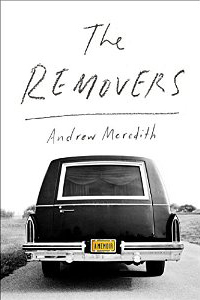Book Notes
 Andrew Meredith, The Removers: A Memoir (New York: Scribners, 2014), 179pp.
Andrew Meredith, The Removers: A Memoir (New York: Scribners, 2014), 179pp.
I read this book when I saw that it's about the same unusual subject as Sinan Antoon's novel, The Corpse Washer (2013), the story of a fourth generation "mghassilchi" — a corpse washer and shrouder from a poor Shi'ite family in Baghdad. Antoon's book is Iraqi fiction, whereas Meredith has written an American memoir, but both stories are about sons who follow their fathers into the business of dead bodies. And for both authors literal death is a metaphor for broader, spiritual deaths that they experience. This is Meredith's first book, and it's characterized by remarkable insight and introspection.
Meredith's "downward trajectory" began when he was fourteen and the day that his father was fired from his job as an English professor for sexual harassment. That day "fixed our befores and afters," for "the family as it had been was over." After eleven years of emotional distance and ominous family silence, his father moved out of the house after twenty-eight years of marriage. These were troubled years for Meredith, marked by the "hollow gloom" of depression, drinking, simmering resentment, and a foreboding sense of failure. He flunked out of three colleges in two years, was broke, living at home, and going nowhere fast. So he did what everyone in his dying Philadelphia neighborhood did. He "took the job that came my way from someone I knew."
That someone was his father, who after getting fired took a job as a "remover." For thirty-five dollars a trip, he picked up dead bodies at apartments, houses, nursing homes, or the hospital morgue, and took them to the funeral home. These stories are dreadful, gruesome, humorous, and poignant. Meredith finally graduated from college after ten years and four tries. By then he'd been in the body business for nine years, including a full-time position in a crematorium, where across the years he incinerated thousands of bodies — three hours at 1900 degrees. And that, as you can well imagine, will make a sensitive soul do a lot of thinking. In the end, Meredith's raw honesty moves to grace and maturity, about his family, himself, his work, and the bodies entrusted to him.


